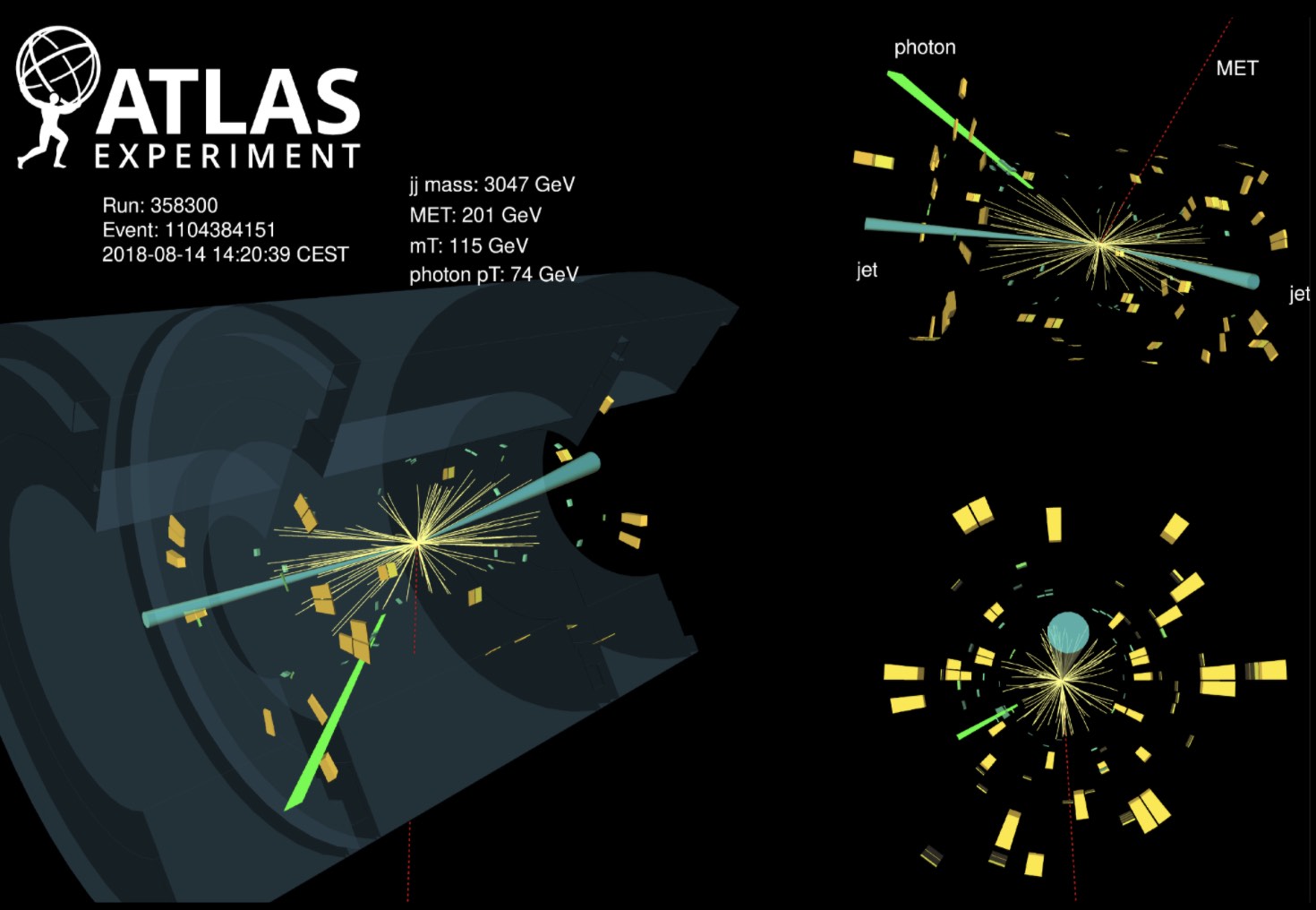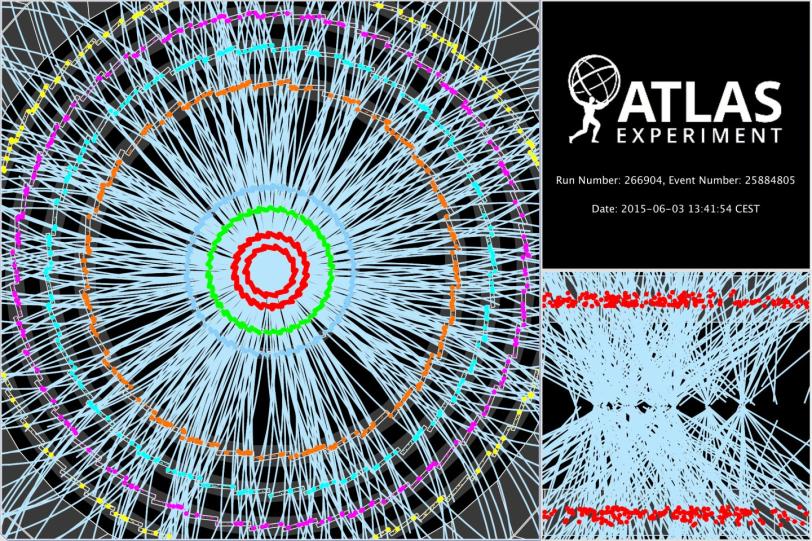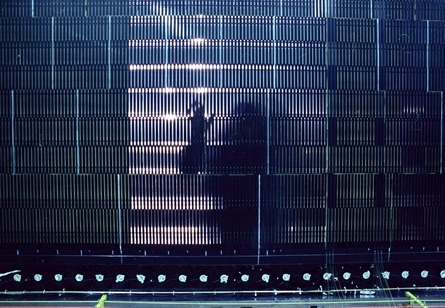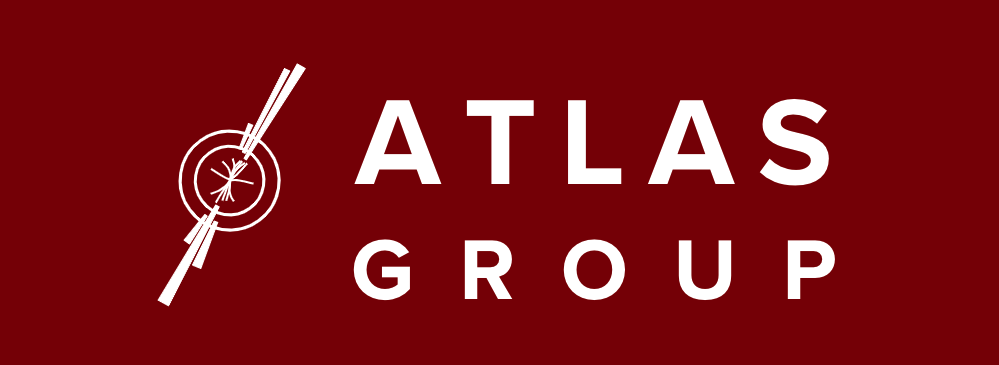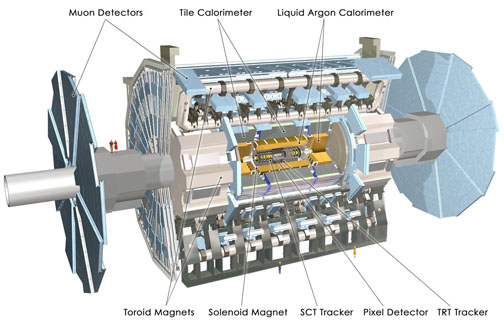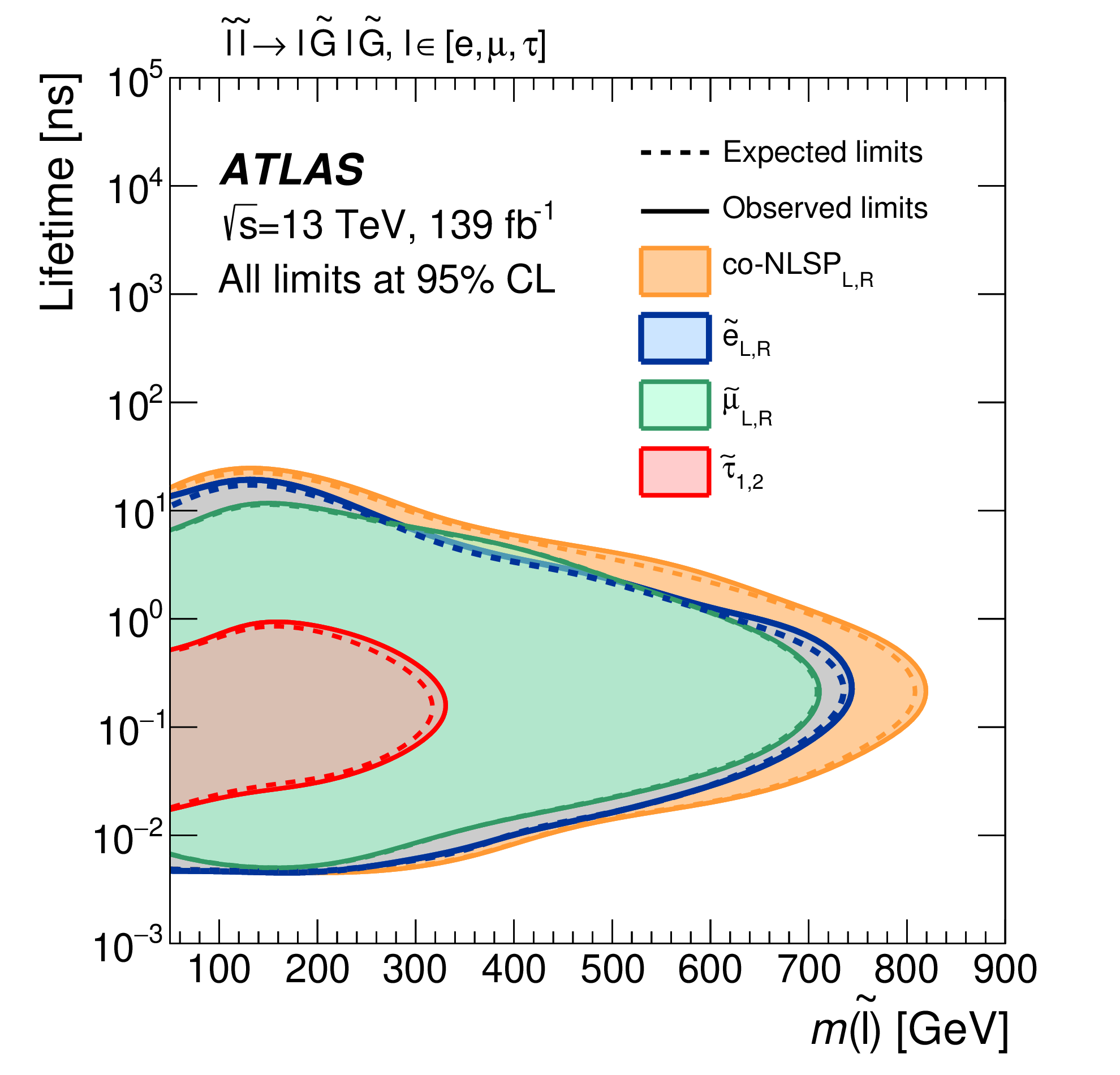| September 22-23, 2021: 🔬Group members co-host the Rising Stars in Experimental Particle Physics Symposium welcoming external early-career scientists with lively discussion |
| June 28-Jul 2, 2021: 🎤Jan Offerman and Emily Smith present talks on machine learning and gFEX commissioning at the ATLAS Collaboration Week |
| June 5, 2021: 🎉Congratulations Emily Smith on being awarded the 2021 Winstein Prize for Instrumentation! |
| April 18-21, 2021: 🎤Lacey Rainbolt, Michael Hank, Kristin Dona, and Jesse Liu present their research at the APS April Meeting 2021; Young-Kee Kim is a panelist in the plenary session "Science on a Global Scale" |
| March 23, 2021: 🎓Todd Seiss (Advisor: Mel Shochet) successfully defends his thesis (Constraining the Higgs Boson Self-interaction Strength with the ATLAS Detector) |
| March 19, 2021: 💡First ATLAS search for vector-boson fusion production of Higgs bosons decaying to dark matter or dark photon with a photon in the final state is a Moriond 2021 highlight, co-ordinated by Doug Schaefer with involvement from Casey Frantz, Lacey Rainbolt, Ellie Rath (ATLAS-CONF-2021-004) |
| January 25, 2021: 🎉Congratulations Cecilia Tosciri on being awarded the 2020 ATLAS Thesis Award! |
| November 19, 2020: 💡UChicago News highlights Tova Holmes, Lesya Horyn, Xiaohe Jia, and Young-Kee Kim on their pioneering search for displaced leptons (arXiv:2011.07812) |
| October 21, 2020: 🎓Lesya Horyn (Advisor: Young-Kee Kim) successfully defends her thesis (A Search for Displaced Leptons in the ATLAS Detector) |
| September 14, 2020: 🔬A warm welcome to Cecilia Tosciri who joins the group as a postdoctoral researcher after completing her DPhil at the University of Oxford on machine learning and Higgs boson physics in bottom quark final states |
| August 15, 2020: 💡Jesse Liu co-authors a CERN Courier article highlighting photon collision results featuring his new measurement using ATLAS Forward Proton (arXiv:2009.14537) |
| July 29-August 6, 2020: 🎤ICHEP2020 features talks by Tova Holmes on supersymmetric long-lived particles and Jesse Liu on the ATLAS Forward Proton detector |
| May 26, 2020: 🎤Doug Schaefer presents at the LHCP2020 Conference impressive results on Higgs boson decays to invisible dark matter particles (ATLAS-CONF-2020-008) |
| February 13, 2020: 🎉UChicago News covers the National Science Foundation commitment to fund ATLAS Upgrade projects for the High-Luminosity LHC |
| December 16-20, 2019: ✈️US ATLAS Hadronic Final State Forum is hosted by the Chicago group co-organized by David Miller featuring lively discussions and projects on jet physics |
| June 17, 2019: ATLAS Collaboration Week this week at CERN features reports from Max Swiatlowski on Jets and Missing energy, Lesya Horyn on the Early Career Scientist Board, and Doug Schaefer on Vector boson fusion and scattering measurement and modelling |
| June 12-14, 2019: Emily Smith and David Miller present results and future possibilities for machine learning using Multi-Processor System-on-Chip (MPSoC) hardware devices at the first System-on-Chip Workshop
|
| May 12-17, 2019: Young-Kee Kim presents the Perspective on the European Strategy from the Americas at the Open Symposium - Update of the European Strategy for Particle Physics |
| May 9, 2019: Emily Smith is featured in the Physical Sciences Division Spotlight |
| May 5-10, 2019: Lesya Horyn and Max Swiatlowski talk about Commissioning and doing Physics with the FTK in the 2019 ATLAS Trigger Workshop in Elba, Italy |
| April 10, 2019: Results in search for dark matter production using invisible Higgs decays [arXiv:1904.05105] released and submitted to PRL |
| April 1, 2019: Congratulations to Emily Smith who has been offered the NDSEG Fellowship, to start in Fall 2019! |
| Feburary 27, 2019: Welcome to Marc Weinberg, a new member of Rob Gardner's scientific computing team! Marc joins us from Carnegie Mellon University where he was a postdoc on CMS and a Distinguished researcher at the LHC Physcs Center, based at Fermilab |
| January 23, 2019: Congratulations to graduate student Lesya Horyn (Advisor: Young-Kee Kim) on her appointment to the ATLAS Early Career Science Board! |
| October 17, 2018: The gFEX production trigger system (coordinated by David Miller) takes first collision data during Stable Beams! |
| September 27, 2018: Planning workshop for building a new Cyberinfrastructure and Data-Intensive Analytics Training program at UChicago held with scientists from UChicago, Argonne, Fermilab, and industry partners from Amazon and Udacity. |
| September 18, 2018: Graduate student Patrick Bryant (Advisor: Mel Shochet) successfully defends his thesis (Search for Pair Production of Higgs Bosons in the Four Bottom Quark Final State Using Proton-Proton Collisions at sqrt(s) = 13 TeV with the ATLAS Detector)! |
| September 17, 2018: Graduate student Joakim Olsson (Advisor: David Miller) successfully defends his thesis (Searching for supersymmetry in Fully Hadronic Final States with the ATLAS Experiment)! |
| July 30 - Aug 2, 2018: Current and Former Chicago students, postdocs, faculty meet at the 2018 US ATLAS Summer Workshop in Pittsburgh! See the photos here and here. |
| July 23, 2018: Search for SUSY with many b-jets and jet substructure in 80 fb-1 of LHC data released! (ATLAS-CONF-2018-041) |
| July 16-20, 2018: 10th annual BOOST Conference on Boosted Object Phenomenology, Reconstruction and Searches in HEP takes place in Paris, France hosted by former postdoc Reina Camacho (now permanent at LPNHE) and with a talk on SUSY Searches with Boosted Objects from David Miller. |
| July 9-13, 2018: The 2018 Fermi Summer Interns Program in Science for local 7th graders is hosted by David Miller and Dave Schmitz (neutrinos), with a lecture on ATLAS! |
| May 23-25, 2018: Chicago students and postdocs (Lesya, Giordon, Tova, Max) present research and new ideas at the ATLAS Supersymmetry Workshop in Stockholm, Sweden |
| May 17, 2018: May 2, 2017: Graduate student Patrick Bryant (Advisor: Mel Shochet) has been awarded the 2018 Nathan Sugarman Award for Excellence in Graduate Student Research! |
| May 16, 2018: Rob Gardner hosts panel on "Future Tools: What tools do we need to enable pioneering research" at Future Compute: A Celebration of the Computation Institute |
| April 26, 2018: Graduate student Giordon Stark (Advisor: David Miller) successfully defends his thesis (The search for supersymmetry in hadronic final states using boosted object reconstruction: (https://arxiv.org/abs/1711.01901))! |
| April 24-26, 2018: Chicago effort on designing trigger systems using new "multi-processor system-on-chip" (MPSoC) technology presented at the Sixth Common ATLAS CMS Electronics Workshop for LHC Upgrades |
| April 17, 2018: LHC declared STABLE BEAMS for the first time in 2018. Two colliding bunches with an average bunch intensity of 1.1e11 delivered at 13 TeV to all the LHC experiments. |
| April 7-8, 2018: David Miller represents Chicago and the US LHC Users Association (USLUA) at the 2018 USA Science & Engineering Festival |
| March 19, 2018: MWT2 announced as top-performing 2017 Tier2 Computing Center in the world, rated above all other computing centers in ATLAS, including all Tier1 centers, in terms of CPU wall time delivered. |
| March 13, 2018: Rui Zou presents her paper "Search for invisible Higgs boson decays in vector boson fusion at 13 TeV with the ATLAS detector" to the ATLAS Collaboration. |
| February 8, 2018: Midwest Tier 2 Computing Center (MWT2) Fest annual get-together of team members and staff from UC, Indiana and Illinois, hosted in PRC 201. |
| December 12, 2017: Search for production of Higgsinos in multi-b final states released! (ATLAS-CONF-2017-081) |
| December 11-15, 2017: Key contributions to the 2017 Hadronic Final State Forum from Giordon Stark (Advisor: David Miller), which was hosted at Southern Methodist University this year |
| December 6, 2017: gFEX passes the Production Readiness Review (PRR) and has been given the green light to begin production! |
| December 4-8, 2017: Chicago group members contribute to the 2017 ATLAS physics workshop: Physics with 120 fb-1 |
| November 22, 2017: First measurement of the soft drop jet mass released! (http://arxiv.org/abs/1711.08341) |
| November 20, 2017: During commissioning of the FTK hardware track finder, the Chicago built AUX board processed more than 1 billion events in a 6 hour run! |
| November 6, 2017: Search for SUSY in multi-b final states released! (http://arxiv.org/abs/1711.01901) |
| November 3, 2017: Graduate student Kevin Hildebrand (Advisor: Mark Oreglia) wins Lightning Round competition at the Annual US LHC Users Association meeting at Fermilab! |
| October 30, 2017: ATLAS Group organizes and hosts the EFI Workshop on Data Analytics for Physics |
| May 30, 2017: Graduate student Giordon Stark (Advisor: David Miller) awarded the 2017 Nathan Sugarman Award for Excellence in Graduate Student Research! |
| May 2, 2017: Graduate student Patrick Bryant (Advisor: Mel Shochet) has been selected as the 2017-8 Grainger Graduate Fellow! |
| January 31, 2017: Graduate student Miles Wu (Advisor: David Miller) successfully defends his thesis (Measurement of collinear W boson emission: (http://arxiv.org/abs/1609.07045))
|
| January 21, 2017: Graduate student Karol Krizka (Advisor: Young-Kee Kim) awarded the illustrious Chamberlain Fellowship at Lawrence Berkeley National Laboratory! |
| October 1, 2016: Postdoctoral scholar Max Swiatlowski appointed as convener of the subgroup on SUSY searches in squark and gluino final states and signatures in ATLAS! |
| September 22, 2016: Measurement paper for collinear W emission (i.e "W-strahlung") released (http://arxiv.org/abs/1609.07045) |
| August 5, 2016: Physics Briefing ICHEP 2016: Hunting for new physics with boosted bosons |
| August 4, 2016: 13 TeV results in search for diboson resonances in the VV and VH topologies decaying hadronically released (ATLAS-CONF-2016-055 and ATLAS-CONF-2016-083) |
| August 1, 2016: Welcome to Chicago, a hub for particle physics research |
| August 4, 2016: Results in the search for SUSY in multi-b final states using 2015+2016 data reported (ATLAS-CONF-2016-052) |
| August 3, 2016: Six Chicago ATLAS members presenting new results and highlights at ICHEP 2016! Miles Wu (on collinear W emission), Ilija Vukotic (on ATLAS computing analytics), David Miller (on SUSY searches and gFEX hardware), Karol Krizka (on FTK hardware and dark matter searches), Rob Gardner (on HEP Computing), and John Alison (on b-jet triggers and Higgs searches)
|
| August 1, 2016: Higgs discovery raises new questions: Bump in collider data: a siren song or new particle? |
| August 1, 2016: Computation propels LHC discoveries: UChicago electronics sort through flood of physics data |
| July 30, 2016: Run 2, 13 TeV boosted Higgs identification and gluon to bb studies released (ATLAS-CONF-2016-039) |
| June 8, 2016: Results in search for the Standard Model Higgs boson produced by vector-boson fusion in 8 TeV pp collisions and decaying to bottom quarks with the ATLAS detector released and submitted to JHEP (arXiv:1606.02181 [hep-ex]) |
| May 30, 2016: Results in search for gluino pair production decaying to 4 tops using boosted objects released (http://arxiv.org/abs/1605.09318) |
| April 1st, 2016: Postdoctoral scholar Reina Camacho appointed as convener of the subgroup on Exotics searches using diboson signatures in ATLAS! |
| March 28, 2016: Results in the search for resonances in the dijet mass distribution with 1 or 2 jets identified as b-jets at sqrt(s)=13 TeV released! (An ATLAS first!) (EXOT-2015-22) |
| March 25 and 29, 2016: Beam splashes at the LHC: 2016 data taking beings!!! |
| March 17, 2016: Results in the search for pair production of Higgs bosons in the 4b final state at sqrt(s)=13 TeV reported (ATLAS-CONF-2016-017) |
| March 8, 2016: Postdoctoral scholar Reina Camacho featured among the 7 inspiring women from the ATLAS experiment in celebration of International Women's Day 2016 |
| March 7-8, 2016: UChicago will be hosting the UChicago/ASC-ANL software tutorial! |
| February 29, 2016: Run 1 gluon to bb substructure CONF note released (ATLAS-CONF-2016-002) |
| February 24, 2016: Congratulations to Postdoctoral scholar Gabriel Facini who was awarded a coveted STFC Rutherford Fellowship! |
| February 24, 2016: Jet energy scale uncertainties using full 13 TeV 2015 dataset released (JETM-2016-002, JETM-2015-003) |
| January 27, 2016: Run 1 RPV SUSY Stop paper released (http://arxiv.org/abs/1601.07453) |
| December 18, 2015: Run 2 search paper in photon+jet mass released (http://arxiv.org/abs/1512.05910) |
| December 15, 2015: ATLAS and CMS present physics results from Run 2 at special CERN Seminar! including indications of an excess in the diphoton mass spectrum |
| December 15, 2015: Run 2 search paper for fully hadronic diboson resonance released (ATLAS-CONF-2015-073) |
| December 14, 2015: Run 2 search paper for SUSY in multi-b final states with top-tagging applied (ATLAS-CONF-2015-067) |
| December 8, 2015: Run 2 search paper for strong gravity in mulijet events released (EXOT-2015-09) |
| December 4, 2015: Run 2 search paper in dijet mass and angular distributions released! (First Run 2 seach paper!) (EXOT-2015-02) |
| November 22, 2015: Yangyang Cheng and Max Swiatlowski win the 2015 US LHC Users Association Lightning Round competition! |
| October 22, 2015: Run 1 search paper on dark matter produced in association with a Higgs boson decaying to two bottom quarks released (http://arxiv.org/abs/1510.06218) |
| October 15, 2015: Run 1 paper on pile-up mitigation techniques for jets released (http://arxiv.org/abs/1510.03823) |
| August 12, 2015: Run 2, 13 TeV jet inputs PUB note released (ATL-PHYS-PUB-2015-036) |
| August 11, 2015: Run 2, 13 TeV boosted Higgs identification PUB note released (ATL-PHYS-PUB-2015-035) |
| August 10, 2015: Run 2, 13 TeV boosted W tagging PUB note released (ATL-PHYS-PUB-2015-033) |
| July 22, 2015: Run 1 RPV SUSY Stop CONF note released (ATLAS-CONF-2015-026) |
| June 30, 2015: Run 1 RPV SUSY Multijet Paper published Phys. Rev. D 91, 112016 (2015) (http://arxiv.org/abs/1502.05686) |
| June 19, 2015: Run I search for new massive bosons builds excitement for Run II (with major contributions from Chicago Postdoc Reina Camacho) |
| June 17, 2015: Congratulations to Gabriel Facini who has won a 2015 ATLAS Outstanding Achievement Award (with Anthony Morley) for his work on tracking in a dense environment. |
| June 4, 2015: First stable beam collisions in ATLAS (Setting Off To New Energy Horizons) |
| May 7, 2015: US-CERN Agreement Paves Way for New Era of Scientific Discovery |
| April 7, 2015: Beam Splashes at the LHC (Splashes for Synchronization) |
| March 19, 2015: Track reconstruction in dense environment PUB note released (ATL-PHYS-PUB-2015-006) |
| March 13, 2015: Global Sequential Calibration CONF note released (ATLAS-CONF-2015-002) |
| March 5, 2015: 14 TeV sensitivity for dijet searches PUB note released (ATL-PHYS-PUB-2015-004) |
| February 15, 2015: Reina Camacho joins group, new lead on boosted Higgs tagging effort |
| February 4, 2015: Boosted object trigger for Run 3 (gFEX) Preliminary Design Review Approved |
